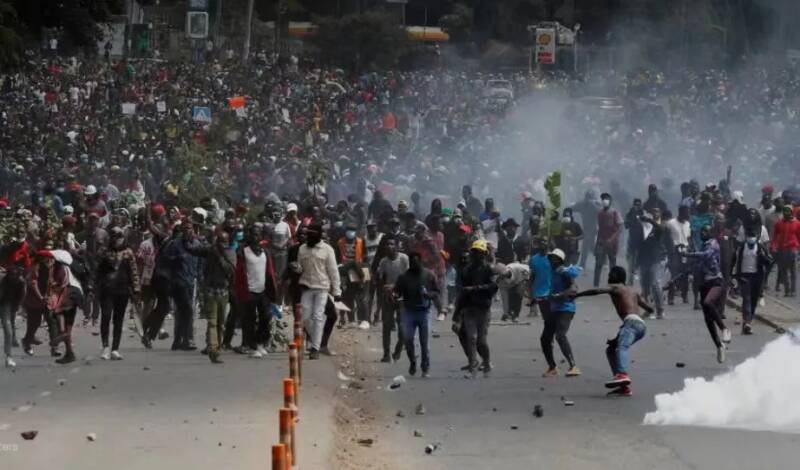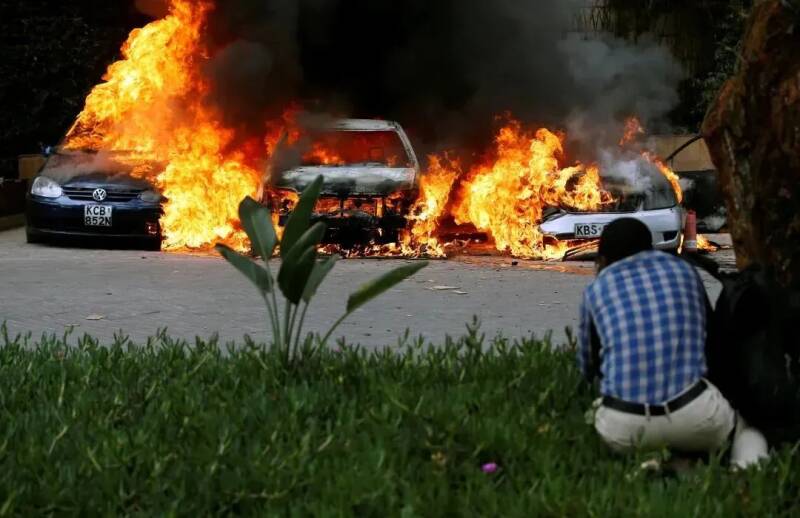Don't buy it! President withdraws tax increase Kenyan people continue to march
According to several Kenyan media reports, on July 16, Kenyans once again took to the streets to continue demonstrations against the Ruto government. Moreover, the demonstration was held not only in the capital Nairobi (Nairobi), but also in Mombasa (Mombasa), Nakuru (Nakuru), Kericho (Kericho), Kisii (Kisii) and Meru (Meru).

The march stems from the Finance Act of 2024 (The Finance Bill, 2024) pushed by Kenyan President William Rutto and the current Kenyan central government in June this year. The fiscal bill makes it clear that it will raise 346.7 billion Kenyan shillings ($2.67 billion) in the form of additional taxes to continue to pay interest on high sovereign debt.
The new tax increase will impose a 16% VAT on the purchase of bread, sugar transportation, the use of mobile communications and financial services, and foreign currency transactions. However, for the people, they have been facing the pressure of life, as well as the continuous impact of the earlier COVID-19 epidemic, geopolitical economic shocks such as rising prices and currency devaluation, and resentment against the government has been accumulated, which eventually led to violent conflicts.

During the conflict, protesters stormed the Kenyan parliament building, destroying facilities and setting fire to some parliament buildings. Kenyan police opened fire on the protesters, resulting in a total of 50 deaths, 413 injuries and huge material damage.
Due to the serious impact of the incident, President Ruto finally announced in a televised speech that he had refused to sign the Finance Act of 2024, but demonstrations and other actions did not stop. in early July, young people in some parts of Kenya continued to march on a small scale. During this period, President Ruto also issued a series of measures, but with little effect.
After that, President Ruto made a televised speech announcing the dissolution of the cabinet of the Ruto government, with the exception of the Chief Minister and Minister for Foreign Affairs, all serving cabinet ministers (CS) and the Attorney General (AG) were dismissed.
However, calls for President Ruto's resignation remain high, and many Kenyans believe that Kenya's ruling party has done nothing in its two years in power. As a result, demonstrations continue to this day, and on July 17, posters were released between Kenyans and major social media to gather people to participate in the demonstrations. Some scholars believe that if President Ruto fails to solve the foreign debt and economic problems, the demonstrations are likely to continue.
In fact, the conflict occurred because Kenyans have been facing the pressure of life, affected by the continuous impact of the earlier COVID-19 epidemic, geopolitical spillover effects, two consecutive years of drought and currency depreciation, and so on.
In particular, in the country's important coffee industry, coffee acreage is reported to be decreasing, mainly due to the development of real estate, and the soaring avocado exports in the country have led some farmers to switch to growing avocados, in addition, the financial constraints of the Coffee Research Institute (the only certified supplier of planting materials) have hindered the establishment of new coffee farms.
In addition, the Coffee regulations 2019 and the Capital Markets (Coffee Exchange) regulations 2020 were implemented earlier, resulting in the closure of a number of coffee processing plants in the country without permits (including the world-renowned coffee trading company NKG).
At present, it can only be dealt with in the cooperative processing plants owned by the Union of planting Cooperatives (NKPCU) or with permits, due to the small scale of some processing plants, the accumulation of goods, and the decay of coffee cherries due to delays in processing.
Moreover, at present, many of the areas where demonstrations have taken place are the country's famous coffee producing areas and port areas. as they are related to interests, many workers have also participated in the demonstrations, resulting in increased delays in coffee production, processing and export. And the current political situation in Kenya is quite unstable, facing the possibility of major changes, coffee industry insiders are not sure of the government's future policy, that the future of coffee and other industries is still uncertain.
Important Notice :
前街咖啡 FrontStreet Coffee has moved to new addredd:
FrontStreet Coffee Address: 315,Donghua East Road,GuangZhou
Tel:020 38364473
- Prev

When Nongfu Spring went to Hong Kong to negotiate, the Hong Kong Consumer Council issued a clarification and apologized
▲ Click to pay attention| On the 15th, the Daily Boutique Coffee Culture Magazine Coffee Factory, the Consumer Council of Hong Kong published an article "Drinking Water Siyuan 30 Bottled Water Taste, Minerals, and Safety Testing", which mentioned that the bromate content of bottled water samples from Nongfu Spring and Baisuishan reached the EU standard. The upper limit has aroused concern from all walks of life.
- Next

Introduction to Mbeya, the coffee producing area of Tanzania, Africa
In Africa, there are many well-known coffee producing countries, such as Ethiopia, Kenya, Rwanda and Tanzania. Although Tanzania is not as famous as neighboring Kenya, it can also produce high-quality coffee. Coffee first became the staple of Tanzania (formerly Tanganyika) during German colonial rule
Related
- What grade does Jamaica Blue Mountain No. 1 coffee belong to and how to drink it better? What is the highest grade of Blue Mountain coffee for coffee aristocrats?
- What are the flavor characteristics of the world-famous coffee Blue Mountain No. 1 Golden Mantelin? What are the characteristics of deep-roasted bitter coffee?
- Can I make coffee a second time in an Italian hand-brewed mocha pot? Why can't coffee be brewed several times like tea leaves?
- Hand-brewed coffee flows with a knife and a tornado. How to brew it? What is the proportion of grinding water and water temperature divided into?
- What is the difference between Indonesian Sumatra Mantinin coffee and gold Mantinin? How to distinguish between real and fake golden Mantelin coffee?
- What does bypass mean in coffee? Why can hand-brewed coffee and water make it better?
- Unexpected! Ruixing Telunsu lattes use a smoothie machine to foam milk?!
- % Arabia's first store in Henan opens into the village?! Netizen: Thought it was P's
- Does an authentic standard mocha coffee recipe use chocolate sauce or powder? Mocha Latte/Dirty Coffee/Salty Mocha Coffee Recipe Share!
- What is the difference between Vietnam egg coffee and Norway egg coffee? Hand-brewed single product coffee filter paper filter cloth filter flat solution!

